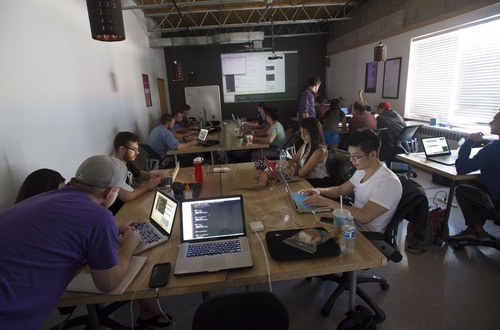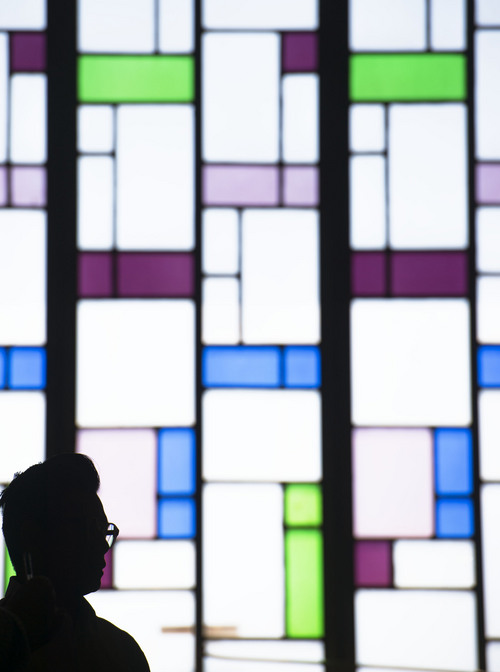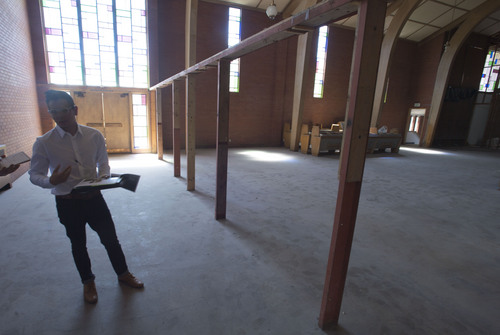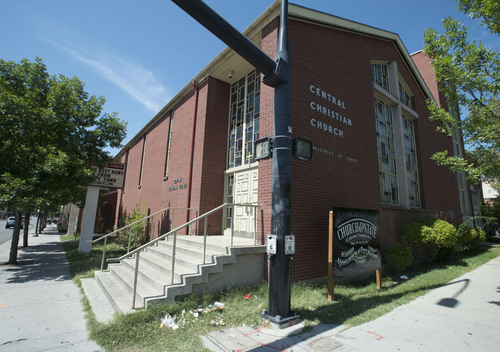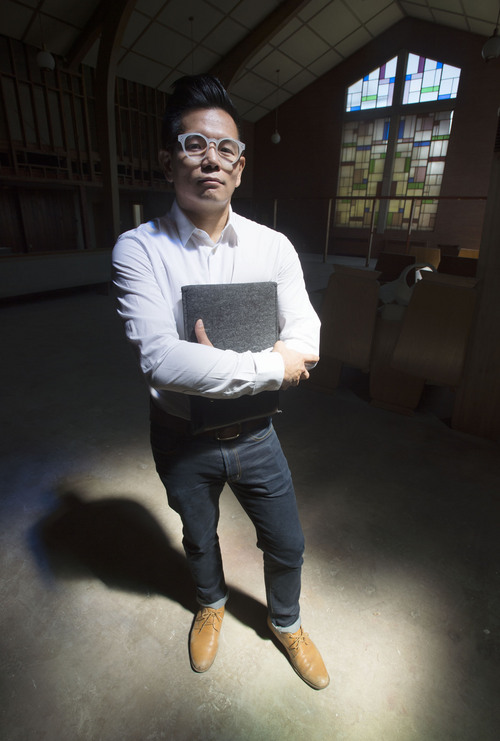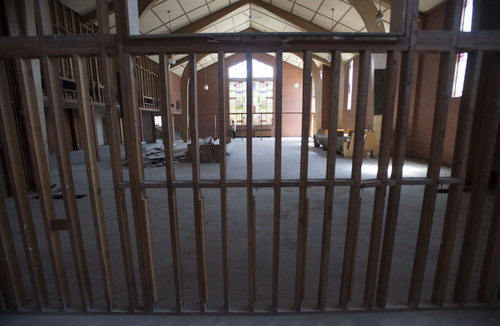This is an archived article that was published on sltrib.com in 2014, and information in the article may be outdated. It is provided only for personal research purposes and may not be reprinted.
A 121-year-old spiritual sanctuary in downtown Salt Lake City is being turned into a kind of philanthropic community incubator for growing new ideas.
The red-bricked Central Christian Church, 370 S. 300 East, is among Utah's oldest venues of Christian worship, established at that locale in 1893. Church leaders sold it last spring after struggling with maintenance costs as they ran a nondenominational ministry to a largely moderate-income inner-city congregation.
Known to passers-by for witty religious quips posted on its marquee, the run-down building is being gutted and modernized. The new owners have dubbed it the Church & State Business Center.
Unlike for-profit business incubators, Church & State is what one of its founders, Thomas Lee, called "an altruistic play."
"We're trying to present new entrepreneurs with a platform that is free and nonpredatory," said Lee, a major backer of the project along with Holladay-based investor Ron Heffernan. "In a way, we're gifting the building back to the community."
With investor backing, a cooperative model for prospective tenants and a no-debt business plan, they hope to provide a sort of pro-bono foothold for fledgling companies they recruit and house. The 20,000-square-foot facility will offer free and reduced-rent office space along with advice and a host of business-nurturing and technical resources to startup and early-stage companies created by new and serial entrepreneurs.
Church & State's no-strings-attached approach, Lee said, is meant to spare emerging businesses from having to surrender control of their ideas to venture capitalists in exchange for financial backing.
The 36-year-old businessman and Los Angeles native is the creative director for a successful design, brand-marketing and business development firm headquartered in Salt Lake City called Process Agency.
Lee, who described overhauling old buildings downtown as a hobby, was recently involved in renovating the historic Guthrie Building at 150 E. 200 South. Constructed in 1887, that site now houses FICE Gallery & Clothing Boutique and Este Pizzeria, along with creative studios for more than 30 artists.
Now several months into the church overhaul, Lee and Heffernan envision an open, modern, communal workspace beneath the chapel's vaulted wooden arches, designed to maximize productive contacts among employees of various startups.
"The idea is to create a space that has a unique energy that creates collisions between individuals," Lee said. "We want to create a unique vibe and feel that's untraditional to traditional business."
When the remodel is done, likely early next year, he said, "this is a project that I believe could be an epicenter for Salt Lake.''
In an upper room of the church, two dozen novice computer programmers filled a dimly lit classroom, toiling in front of screens or lounging on oversized bean-bag seats as they flicked through their smartphones. They are students with Church & State's first official tenant, DevPoint Labs, which provides a three-month computer-coding boot camp.
In exchange for office space and use of the trendy classroom — the sole spot in the church where remodeling is nearly done — the 1-year-old startup will give select employees from other tenant companies access to DevPoint's intensive, $8,500-per-term course training at no cost, according to company co-founder Ty Diamse.
The arrangement typifies Church & State's approach, Diamse said. And it's not just would-be world innovators who are taken with Lee's notion of "economic evangelism," as he and Heffernan call it.
Among other backers, the Church & State project has received a $200,000 grant through the Department of Workforce Services. It also will be a landing place for startups created by graduates of the University of Utah's Lassonde Entrepreneur Institute, a division of the U.'s David Eccles School of Business.
The institute's executive director, Troy D'Ambrosio, said its budding entrepreneurs generate as many as 15 to 20 startups a year in sectors as diverse as technology, medical devices, clothing, business services and sports equipment.
"They graduate and outgrow us," D'Ambrosio said. "Having a place they can go and transition into is really critical."
Lee strode last week through the church's dust-covered hallways and spacious main chapel, its worn, cushioned pews piled against the stripped walls. Sunlight poured through rectangular panes of stained-glass windows that cover the building's exterior.
Plans for the revamped chapel, Lee said, are laid out to accommodate various community events after hours. Church relics and many of the building's major architectural features are being incorporated and preserved in the interior decor.
"We do want to always speak to the history of this building," he said. "It was a church for 100 years and that is important to us."
Originally, Lee also intended to let the church congregation continue its weekly services in the chapel free of charge. Those plans fell through, however, when asbestos removal forced the building to close for three weeks.
"It just wasn't going to work out," Central Christian Church Pastor Steve Sandlin said.
Church members are now searching for a new location, Sandlin said. In the meantime, they're conducting services outdoors each week across town in a grassy corner of International Peace Gardens at Jordan Park.
"The weather has been perfect for us every Sunday," the pastor said. "We're confident that God is going to provide something to us."
Twitter: @Tony_Semerad


